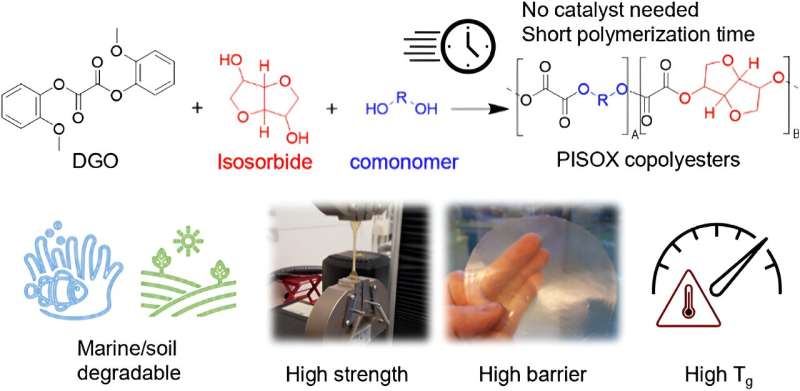This article has been reviewed according to Science X's editorial process and policies. Editors have highlighted the following attributes while ensuring the content's credibility:
fact-checked
peer-reviewed publication
trusted source
proofread
Exciting applications for marine degradable, bio- and CO2-based PISOX polymers

Researchers at the Industrial Sustainable Chemistry (ISC) group at the Van 't Hoff Institute for Molecular Sciences have developed a new class of bio- and CO2 based PISOX polymers with surprising properties and applications.
In a paper published in ACS Sustainable Chemistry and Engineering, they present the novel polyesters and discuss their potential.
PISOX polymers are truly unique in their combination of properties. They display high-performance characteristics, both thermally and mechanically, but even so decompose relatively easily to CO2 and biomass. For instance, under home-composting conditions in soil, PISOX degrades in just a few months. Under aqueous conditions it hydrolyzes in less than a year at 20°C, without the need for enzymes.
Lead author of the study is Ph.D. student Kevin van der Maas who will defend his thesis later this year. It also features contributions by former Ph.D. students Dr. Yue Wang and Dr. Daniel H. Weinland. The research was carried out in cooperation with LEGO and chemical technology development company Avantium, of which UvA ISC group leader Prof. Gert-Jan Gruter is the Chief Technology Officer.
The paper describes the polymer synthesis from diaryl oxalates and isosorbide, that can both be obtained from renewable sources. It compares the PISOX properties to those of popular polymers such as PET and ABS. It also discusses how the combination of PISOX properties—including high barrier properties—can be utilized.
Among the potential applications are compostable plastic bags and mulch films for gardening and agriculture, and packaging plastics with diminished environmental impact.
As a follow-up to the research presented in the paper, current research explores the possibility of using PISOX in temporary "artificial reefs," for instance to provide support to mussel banks and plants. After growth these structures can "dissolve" in the seawater. Another explorative project concerns the use of PISOX for 3D printed personalized coffins to be used in resomation (alkaline hydrolysis).
More information: Kevin van der Maas et al, PISOX Copolyesters─Bio- and CO2-Based Marine-Degradable High-Performance Polyesters, ACS Sustainable Chemistry & Engineering (2024). DOI: 10.1021/acssuschemeng.4c02266
Journal information: ACS Sustainable Chemistry & Engineering
Provided by University of Amsterdam





















